Taoyuan Mayor Cheng Wen-tsan (鄭文燦) yesterday said he would not press charges against opponents of pension reform who allegedly broke two of his ribs, because of a belief in democratic politics.
Cheng said on Facebook that he never thought his injuries would attract so much attention.
“I was only there at the legislature on the day of the protest to try to secure a portion of the budget earmarked for the government’s Forward-looking Infrastructure Development Program for my city. It is regrettable that the protesters were so agitated ... that they tried to push people around and attack them,” Cheng said.
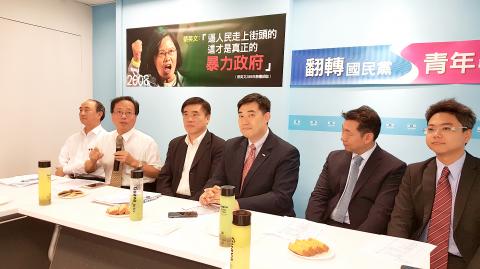
Photo: Shih Hsiao-kuang, Taipei Times
Cheng said he did not seek medical attention until Monday, when an examination found that his injuries were more serious than he imagined, requiring two to six weeks to heal.
Nevertheless, the mayor said he still believes in the values of democratic politics and is confident that society is capable of resolving conflicts through rational discussion.
“Therefore, I do not intend to press charges. I hope the public can calm down and use dialogue instead of violence,” Cheng said.
Cheng on Wednesday last week was on his way to a legislative joint committee meeting when he and other local government leaders and legislators were allegedly assaulted by people protesting the government’s plan to reform pension schemes for public servants and public-school teachers.
Taoyuan Department of Public Information Director Xavier Chang (張惇涵) on Monday said that the mayor sustained fractures of the seventh and eighth ribs on his right side.
Democratic Progressive Party Legislator Tuan Yi-kang (段宜康) took to Facebook to call on National Civil Servant Association president Harry Lee (李來希), a protest leader, to explain what happened to Cheng.
At a news conference in Taipei, Lee said that opponents of pension reform who resorted to violence during the demonstrations last week were provoked by the legislature’s cruel installation of barb-wired barricades.
“The anti-reform protesters would not have lost control if they had not been painted into a corner,” Lee said.
“The core of the pension conundrum we see today is private-sector workers getting too little in pension payments, while not-yet-retired public servants get too much. Though [pension reform opponents’] actions were inappropriate and regrettable, who do you think caused them?” Lee said.
The nation has seen many protests over separate issues since President Tsai Ing-wen’s (蔡英文) administration took office in May last year, so why is it that only pension reform demonstrators have been subjected to legal proceedings, Lee said.
He also lauded Cheng’s decision not to press charges.
The nation will be a better place if the kind of magnanimity demonstrated by Cheng could rub off on other politicians, Lee said.
Reform opponents are to stage another protest on May 20, the first anniversary of Tsai’s inauguration, he added.
Chinese Nationalist Party (KMT) Vice Chairman Hau Lung-bin (郝龍斌), a former Taipei mayor, who also attended the news conference, questioned the government’s description of protesters actions as “violent.”
“The unarmed civil servants, in an attempt to preserve their dignity and rights, only pulled on the clothing [of passing lawmakers and government officials] and threw water at them. Can this be called violence?” Hau said.
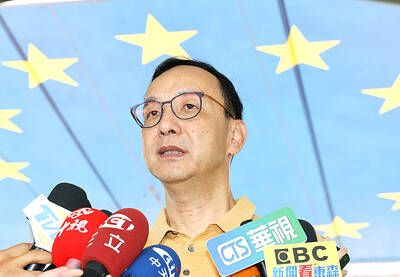
GOOD DIPLOMACY: The KMT has maintained close contact with representative offices in Taiwan and had extended an invitation to Russia as well, the KMT said The Chinese Nationalist Party (KMT) would “appropriately handle” the fallout from an invitation it had extended to Russia’s representative to Taipei to attend its international banquet last month, KMT Chairman Eric Chu (朱立倫) said yesterday. US and EU representatives in Taiwan boycotted the event, and only later agreed to attend after the KMT rescinded its invitation to the Russian representative. The KMT has maintained long-term close contact with all representative offices and embassies in Taiwan, and had extended the invitation as a practice of good diplomacy, Chu said. “Some EU countries have expressed their opinions of Russia, and the KMT respects that,” he
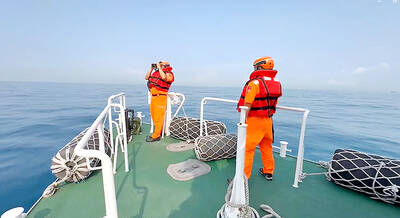
An increase in Taiwanese boats using China-made automatic identification systems (AIS) could confuse coast guards patrolling waters off Taiwan’s southwest coast and become a loophole in the national security system, sources familiar with the matter said yesterday. Taiwan ADIZ, a Facebook page created by enthusiasts who monitor Chinese military activities in airspace and waters off Taiwan’s southwest coast, on Saturday identified what seemed to be a Chinese cargo container ship near Penghu County. The Coast Guard Administration went to the location after receiving the tip and found that it was a Taiwanese yacht, which had a Chinese AIS installed. Similar instances had also
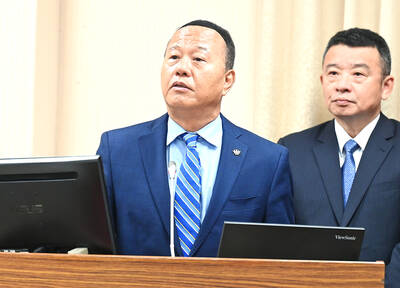
VIGILANCE: The military is paying close attention to actions that might damage peace and stability in the region, the deputy minister of national defense said The People’s Republic of China (PRC) might consider initiating a hack on Taiwanese networks on May 20, the day of the inauguration ceremony of president-elect William Lai (賴清德), sources familiar with cross-strait issues said. While US Secretary of State Anthony Blinken’s statement of the US expectation “that all sides will conduct themselves with restraint and prudence in the period ahead” would prevent military actions by China, Beijing could still try to sabotage Taiwan’s inauguration ceremony, the source said. China might gain access to the video screens outside of the Presidential Office Building and display embarrassing messages from Beijing, such as congratulating Lai
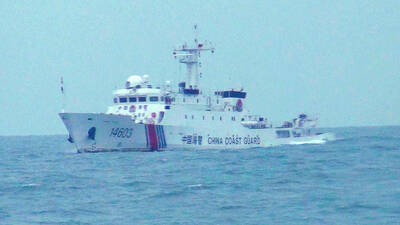
Four China Coast Guard ships briefly sailed through prohibited waters near Kinmen County, Taipei said, urging Beijing to stop actions that endanger navigation safety. The Chinese ships entered waters south of Kinmen, 5km from the Chinese city of Xiamen, at about 3:30pm on Monday, the Coast Guard Administration said in a statement later the same day. The ships “sailed out of our prohibited and restricted waters” about an hour later, the agency said, urging Beijing to immediately stop “behavior that endangers navigation safety.” Ministry of National Defense spokesman Sun Li-fang (孫立方) yesterday told reporters that Taiwan would boost support to the Coast Guard